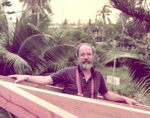Daniel C. Dennett: Difference between revisions
imported>Bruce M. Tindall m (Insignificant change to force appearance in appropriate category lists) |
imported>Ro Thorpe m (rm comma) |
||
| Line 5: | Line 5: | ||
'''Daniel Clement Dennett''' is professor of philosophy at [[Tufts University|Tufts]], and author of several best-selling books including ''Breaking the Spell'', ''Freedom Evolves'' and ''Darwin's Dangerous Idea''. He was born in Boston, Massachusetts, in 1942, the son of a historian of the same name, and grew up in New England. After attending [[Phillips Exeter Academy]] and [[Wesleyan University]], he received his BA in philosophy from [[Harvard University|Harvard College]] in 1965. [[Richard Dawkins]] has called him his intellectual hero. | '''Daniel Clement Dennett''' is professor of philosophy at [[Tufts University|Tufts]], and author of several best-selling books including ''Breaking the Spell'', ''Freedom Evolves'' and ''Darwin's Dangerous Idea''. He was born in Boston, Massachusetts, in 1942, the son of a historian of the same name, and grew up in New England. After attending [[Phillips Exeter Academy]] and [[Wesleyan University]], he received his BA in philosophy from [[Harvard University|Harvard College]] in 1965. [[Richard Dawkins]] has called him his intellectual hero. | ||
With regards to [[free will]], Dennett is a compatibilist - that is someone who believes that free will and determinism are not mutually exclusive - arguing that our idea of free will is a cultural evolution in a deterministic, but not fatalistic, universe<ref>Galen Strawson, [http://query.nytimes.com/gst/fullpage.html?res=9D01E5DC153DF931A35750C0A9659C8B63 Evolution Explains It All For You], ''New York Times''.</ref><ref>Stanford Encyclopedia of Philosophy [http://plato.stanford.edu/entries/compatibilism/#5.2 Compatibilism §5.2 Multiple Views Compatibilism]</ref>. Dennett has also written widely on the subject of consciousness, the philosophy of mind and religion. He is, along with [[Richard Dawkins]], [[Sam Harris]] and [[Christopher Hitchens]], labeled (often disparagingly) | With regards to [[free will]], Dennett is a compatibilist - that is someone who believes that free will and determinism are not mutually exclusive - arguing that our idea of free will is a cultural evolution in a deterministic, but not fatalistic, universe<ref>Galen Strawson, [http://query.nytimes.com/gst/fullpage.html?res=9D01E5DC153DF931A35750C0A9659C8B63 Evolution Explains It All For You], ''New York Times''.</ref><ref>Stanford Encyclopedia of Philosophy [http://plato.stanford.edu/entries/compatibilism/#5.2 Compatibilism §5.2 Multiple Views Compatibilism]</ref>. Dennett has also written widely on the subject of consciousness, the philosophy of mind and religion. He is, along with [[Richard Dawkins]], [[Sam Harris]] and [[Christopher Hitchens]], labeled (often disparagingly) a ''New Atheist''. | ||
== References == | == References == | ||
<references /> | <references /> | ||
Revision as of 10:56, 12 June 2008
Daniel Clement Dennett is professor of philosophy at Tufts, and author of several best-selling books including Breaking the Spell, Freedom Evolves and Darwin's Dangerous Idea. He was born in Boston, Massachusetts, in 1942, the son of a historian of the same name, and grew up in New England. After attending Phillips Exeter Academy and Wesleyan University, he received his BA in philosophy from Harvard College in 1965. Richard Dawkins has called him his intellectual hero.
With regards to free will, Dennett is a compatibilist - that is someone who believes that free will and determinism are not mutually exclusive - arguing that our idea of free will is a cultural evolution in a deterministic, but not fatalistic, universe[1][2]. Dennett has also written widely on the subject of consciousness, the philosophy of mind and religion. He is, along with Richard Dawkins, Sam Harris and Christopher Hitchens, labeled (often disparagingly) a New Atheist.
References
- ↑ Galen Strawson, Evolution Explains It All For You, New York Times.
- ↑ Stanford Encyclopedia of Philosophy Compatibilism §5.2 Multiple Views Compatibilism
